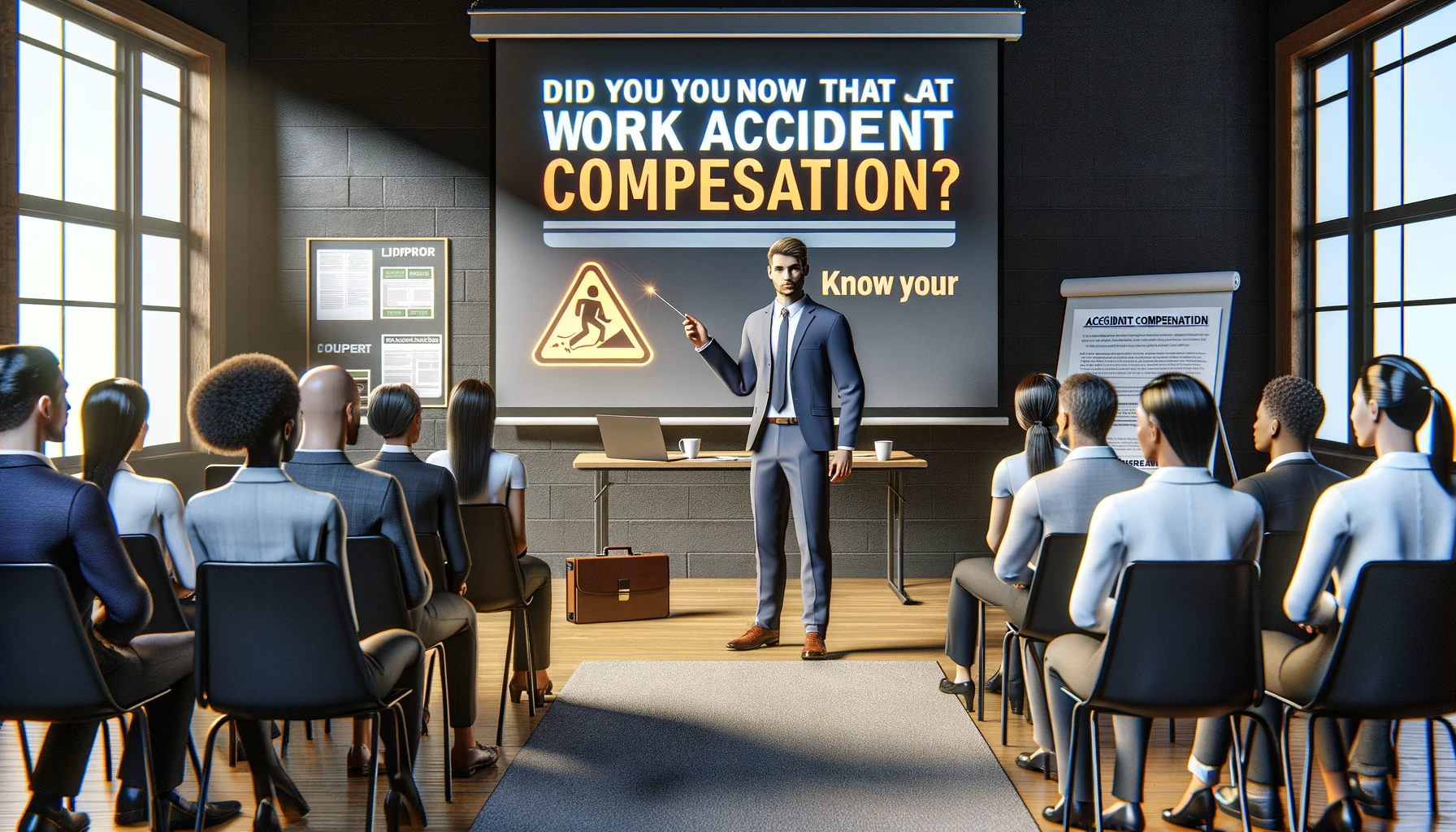Accidents can happen anywhere, including the workplace. When you suffer an injury or accident while on the job, it is essential to understand and protect your labor rights. This article will guide you through the process of safeguarding your rights and seeking compensation for a workplace accident.
Workplace accidents can have severe consequences, both physically and financially. It is crucial to be aware of your rights and the legal protections available to you in the event of an accident at work. By understanding the steps to take and the benefits you are entitled to, you can ensure that your labor rights are protected.
 As an employee who has suffered a work-related injury, you have specific rights that are protected by law. These rights include:
As an employee who has suffered a work-related injury, you have specific rights that are protected by law. These rights include:
 Navigating the legal process after a workplace accident can be complex and overwhelming. Hiring an experienced attorney specializing in workers' compensation can greatly benefit your case. Some reasons to consider seeking legal assistance include:
- Understanding the intricacies of workers' compensation laws
- Maximizing your chances of receiving fair compensation
- Handling negotiations with insurance companies
- Representing you in court, if necessary
Finding the right attorney is crucial. Look for someone with expertise in workers' compensation law, a track record of success, and positive client reviews. During the legal process, your attorney will guide you through each step, ensuring your rights are protected, and advocating for your best interests.
Navigating the legal process after a workplace accident can be complex and overwhelming. Hiring an experienced attorney specializing in workers' compensation can greatly benefit your case. Some reasons to consider seeking legal assistance include:
- Understanding the intricacies of workers' compensation laws
- Maximizing your chances of receiving fair compensation
- Handling negotiations with insurance companies
- Representing you in court, if necessary
Finding the right attorney is crucial. Look for someone with expertise in workers' compensation law, a track record of success, and positive client reviews. During the legal process, your attorney will guide you through each step, ensuring your rights are protected, and advocating for your best interests.
Understanding Workers' Compensation Rights
Workers' compensation is a system designed to provide benefits to employees who are injured or become ill due to their work. It is a form of insurance that employers are required to have to cover the costs of workplace injuries. Workers' compensation rights ensure that employees receive medical treatment, compensation for lost wages, and other benefits. To be eligible for workers' compensation, you must meet certain criteria, such as being an employee of the company, the injury occurring while performing work-related duties, and reporting the accident within a specified timeframe.Steps to Take After an Accident at Work
In the unfortunate event of a workplace accident, there are several crucial steps you should take to protect your rights and ensure a smooth claims process. These steps include:1. Reporting the accident to your employer
It is vital to inform your employer about the accident as soon as possible. This will initiate the workers' compensation process and create an official record of the incident.2. Seeking immediate medical attention
Your health and well-being should be your top priority. Seek medical attention promptly, even if the injury seems minor at first. This will not only ensure proper care but also provide documentation of your injuries.3. Documenting the accident and injuries
Keep a detailed record of the accident, including the date, time, location, and circumstances. Additionally, document any visible injuries and take photographs if possible.4. Gathering evidence and witnesses
If there were witnesses to the accident, collect their contact information. This can be crucial in supporting your claim and establishing the facts of the incident.5. Consulting with an attorney
It is advisable to consult with an experienced workers' compensation attorney who can guide you through the legal process, protect your rights, and help you maximize your compensation.Employee Rights After a Work Accident
 As an employee who has suffered a work-related injury, you have specific rights that are protected by law. These rights include:
As an employee who has suffered a work-related injury, you have specific rights that are protected by law. These rights include:
1. Right to medical treatment and rehabilitation
You have the right to receive necessary medical treatment and rehabilitation services to aid in your recovery.2. Right to receive compensation for lost wages
If your injury prevents you from working, you are entitled to receive compensation for the wages you have lost.3. Right to disability benefits
In cases where your injury results in a temporary or permanent disability, you may be eligible for disability benefits to compensate for the impact on your earning capacity.4. Right to vocational rehabilitation and retraining
If your injury prevents you from returning to your previous job, you have the right to vocational rehabilitation and retraining to help you transition into a new role or profession.Workplace Injury Claim Process
The process of filing and pursuing a workers' compensation claim involves several steps. Familiarize yourself with the following stages to ensure a smooth and successful claims process:1. Filing a workers' compensation claim
Once you have reported the accident to your employer, you will need to file a formal workers' compensation claim. This involves completing necessary paperwork and submitting it to the appropriate agency.2. Review and investigation of the claim
After filing your claim, it will undergo a review and investigation process. This may involve gathering additional evidence, medical evaluations, and interviews.3. Negotiating a settlement or going to court
Depending on the circumstances of your case, you may have the opportunity to negotiate a settlement with the insurance company. If a fair settlement cannot be reached, your case may proceed to court.4. Appeals process
If your claim is denied or you are dissatisfied with the outcome, you have the right to appeal the decision. This involves presenting your case before an appeals board or court.Work-Related Injury Benefits
Workers' compensation provides various benefits to employees who have suffered work-related injuries. These benefits include:1. Medical expenses coverage
Workers' compensation covers all necessary medical expenses related to your workplace injury, including doctor visits, hospital stays, surgeries, medications, and rehabilitation services.2. Temporary total disability benefits
If your injury renders you temporarily unable to work, you may be eligible for temporary total disability benefits. These benefits provide a portion of your lost wages during your recovery period.3. Permanent partial disability benefits
In cases where your injury results in a permanent impairment but does not prevent you from working entirely, you may be entitled to permanent partial disability benefits. These benefits compensate for the impact on your future earning capacity.4. Death benefits for surviving dependents
If a workplace accident results in the death of an employee, their dependents may be eligible for death benefits. These benefits provide financial support to the surviving family members.Legal Remedies for Workplace Accidents
In addition to workers' compensation, there are other legal remedies available to individuals who have been injured in workplace accidents. These include:1. Third-party liability claims
If a third party, such as a contractor or manufacturer, contributed to your workplace accident, you may be able to pursue a personal injury claim against them for additional compensation.2. Personal injury lawsuits
In certain situations, you may have grounds to file a personal injury lawsuit against your employer if they acted negligently or intentionally caused your injuries.3. Social Security disability benefits
If your workplace injury results in a long-term disability that prevents you from working, you may be eligible for Social Security disability benefits.4. Employment discrimination claims
If you believe that you were treated unfairly or discriminated against due to your workplace injury, you may have grounds to file an employment discrimination claim.Importance of Occupational Accident Insurance Coverage
Occupational accident insurance is an additional form of coverage that can provide additional protection in the event of a workplace accident. It offers benefits beyond what workers' compensation provides and can help bridge any gaps in coverage. Some key points to consider regarding occupational accident insurance include: - Understanding occupational accident insurance and its purpose - Benefits of having occupational accident insurance - How to obtain occupational accident insurance coverageSeeking Legal Assistance After a Workplace Accident
 Navigating the legal process after a workplace accident can be complex and overwhelming. Hiring an experienced attorney specializing in workers' compensation can greatly benefit your case. Some reasons to consider seeking legal assistance include:
- Understanding the intricacies of workers' compensation laws
- Maximizing your chances of receiving fair compensation
- Handling negotiations with insurance companies
- Representing you in court, if necessary
Finding the right attorney is crucial. Look for someone with expertise in workers' compensation law, a track record of success, and positive client reviews. During the legal process, your attorney will guide you through each step, ensuring your rights are protected, and advocating for your best interests.
Navigating the legal process after a workplace accident can be complex and overwhelming. Hiring an experienced attorney specializing in workers' compensation can greatly benefit your case. Some reasons to consider seeking legal assistance include:
- Understanding the intricacies of workers' compensation laws
- Maximizing your chances of receiving fair compensation
- Handling negotiations with insurance companies
- Representing you in court, if necessary
Finding the right attorney is crucial. Look for someone with expertise in workers' compensation law, a track record of success, and positive client reviews. During the legal process, your attorney will guide you through each step, ensuring your rights are protected, and advocating for your best interests.
Conclusion
Suffering an accident at work can have significant physical, emotional, and financial consequences. Protecting your labor rights and seeking compensation is essential in such situations. By understanding your workers' compensation rights, taking the necessary steps after an accident, and seeking legal assistance, you can ensure that your rights are upheld and receive the compensation you deserve.Look for an attorney who has the right legal resources for your legal needs.
Contact us here on the Warmuth Law website or through our hotline 888-517-9888.











